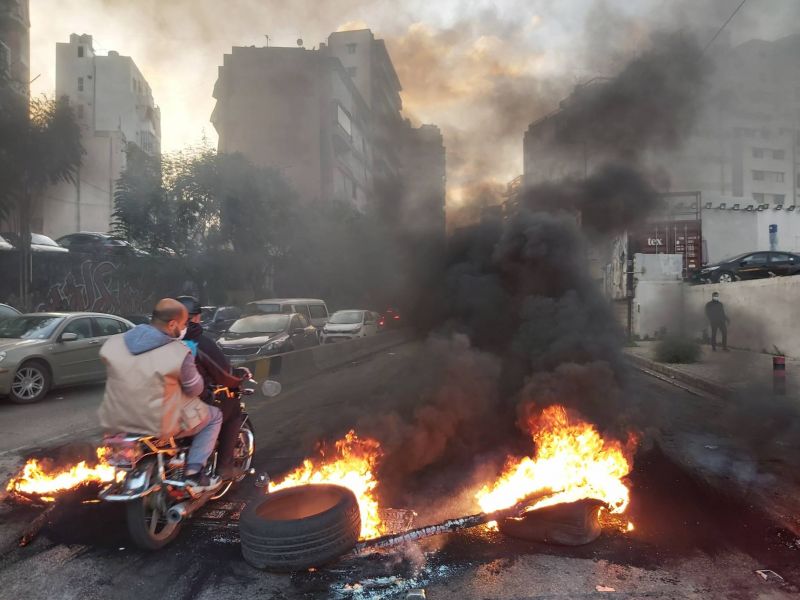
Protesters blocked Beshara al-Khoury street in Beirut with burning tires on Tuesday evening.. (Credit: João Sousa/L'Orient Today)
Protests broke out across the country as the Lebanese pound plunged to record lows. At noon on Tuesday, exchange shops were selling the US dollar for LL10,000 for the first time in Lebanon’s history, surpassing the previous record of LL9,800 from July 2, 2020. In response, protesters blocked roads with burning tires and trash cans and gathered in Beirut’s Martyrs’ Square — a main site of the October 2019 protests against the ruling elite — to decry the depreciation amid worsening living conditions. While the streets erupted in anger, the political class was silent on the record-breaking depreciation, a reflection of their failures to tackle the country’s economic collapse.
Tankers are expected to deliver fuel to power plants in the coming days, as the state electricity company scrambles to address worse-than-usual power cuts. The head of Électricité du Liban told L’Orient Today that the Deir Ammar power plant would receive fuel today, while the Jiyyeh facility would receive a consignment on Thursday. Stocks have run low in both the plants, with the tankers held up offshore by poor weather conditions. A third tanker, laden with fuel oil for the two Turkish power barges anchored off Lebanon’s coast, will unload its cargo once Banque du Liban’s letter of credit for the shipment is confirmed, the EDL chairman said. Lebanon has been experiencing increased electricity cuts over the last few weeks amid fuel shortages.
The reopening of businesses could lead to an increase in coronavirus cases, the head of the parliamentary health committee warned. On Monday, malls, retail shops and other businesses opened their doors for the first time in almost two months, offering relief to those unable to earn a living and make ends meet. However, MP Assem Araji said following a virtual meeting of the committee that Lebanon’s fragile health care system and hospitals would struggle with an increase in cases. Yesterday, the Health Ministry reported 3,098 new cases of COVID-19 and 62 new deaths, bringing the total death toll to 4,805.
Kidney disease patients may be faced with out-of-pocket charges for dialysis as hospitals complain that insurance payouts no longer cover the real cost of treatment. The syndicate of private hospitals issued a statement saying that hospitals might begin asking patients to pay the difference between the sum reimbursed by insurers and the actual cost of equipment and maintenance, which has increased amid a scarcity of dollars and the crash of the lira. The syndicate said it had asked insurers to raise the official cost, or tariff, of a kidney dialysis session from LL154,000 to LL266,000, but that they have not yet responded. A number of hospitals, including the American University of Beirut Medical Center, are already charging for some services at a rate of LL3,900 to the dollar rather than the official rate of LL1,500.
Activist Kinda al-Khatib will be retried after the Military Tribunal accepted an appeal filed by her lawyer. Judge Tani Lattouf agreed to re-examine Khatib’s conviction and three-year prison sentence on charges of collaborating with Israel and entering Israeli territory in a new trial set to begin May 11, her lawyer Joceline al-Rai, told L’Orient Today. Khatib, who denies the charges against her, was sentenced in December along with Charbel Hage, a Lebanese civilian living in the US who was sentenced in absentia to 10 years’ imprisonment.
The Foreign Ministry has called on the UN to investigate the pollution of the Lebanese shoreline following an oil spill off the occupied Palestinian coast. In a statement, the ministry said it had sent an environmental report to the UN. The ministry added that it had requested the international organization to uncover the party responsible for the oil slick “so that Lebanon can claim compensation for severe environmental damage … that it has no power to deal with.” Environmental activists, primarily volunteers, have spent the last week cleaning up the beaches in south Lebanon that had been covered in deposits of black tar that washed up from the Mediterranean Sea.